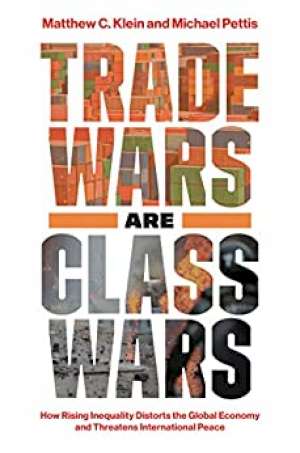15 July 2021
Trade Wars are Class Wars
Matthew Klein and Michael Pettis
2020, Yale University Press, 288 pages,
ISBN 9780300244175
Reviewer: Ian Bright

Countries that produce more than the combined value of what they consume and invest will need to export that excess production to countries that have the opposite characteristics. Both groups can benefit from this compared to a situation of not trading. However, consider a situation where a group of people in one country sets up policies that deliberately restrict consumption in that country. This creates excess production that would need to be exported to other countries or activity in the restrictive country would contract. In this case, trade between countries may not be mutually beneficial. It may shift the consumption in the first country to other countries and displace production that otherwise may have occurred in these other countries. This can be thought of as a form of beggar-my-neighbour policy.
Consumption may be restricted in several ways. Business owners may lobby governments for policies that restrict wage growth or impose employment conditions that limit the bargaining power of labour. Their aim will be to increase the profitability of their businesses, explicitly increasing the profit share and decreasing the labour share of national income. Another way may be that governments may allow favourable treatment for some businesses with the aim of increasing investment in particular industries at the expense of others. For example, industries that provide exports may be more favourably treated than those that provide good for domestic consumption. No matter the approach, excess production is generated that will need to be exported. If these exports are not achieved, the restrictive policies in the first country will lead to a contraction of economic activity.
There is no guarantee that other countries will be willing or able to buy this excess production. One way to guard against this is for businesses making excess profits in the country experiencing restricted consumption to loan money to other countries so that they can buy more. In this case, the combination of under-consumption in the home market and a flow of capital between countries can lead to a situation where financial flows determine trade flows – not the other way round, reversing the usual explanations of flows in international trade and finance.
This approach helps explain how international trade has developed over the past three to four decades. It accommodates issues such as the global savings glut, the motivation behind China’s Belt and Road policy, real income stagnation in several developed countries and the effects of increasing inequality in income and wealth on societies and trade. The link with increasing inequality comes from the tendency for the wealthy to save more than those on lower incomes. As income and wealth inequality has increased in many countries, this has contributed to patterns of under-consumption and trade imbalances between countries.
A key element in this argument is that one class of people in society supports a set of policies that may disadvantage others. Those disadvantaged would include the workers in the home country who face restricted wages and the people in the importing countries who end up indebted. This is how class wars and trade wars interact. It forms the basis of this well written, highly recommended, and thought-provoking book by Matthew C. Klein, the economics commentator at Barron’s magazine and Michael Pettis, professor of finance at Peking’s Guanghua School of Management and a senior fellow at the Carnegie Endowment for International Peace.
The first three chapters outline the theory and evidence behind the argument. These early chapters have useful summaries of the major global financial crises economy over centuries. These sections are useful on their own. Separate chapters relate the approach to China, Germany and the rest of Europe, and the USA. The chapter on China benefits from Prof Pettis’s experience there. The outline of how government policies restrict consumption with the deliberate aim of increasing investment is compelling. It highlights the difficulty China faces in rebalancing from an investment-led model of development to one that allows more consumption.
The arguments in this book extend and develop those in Pettis’s excellent 2013 book “The Great Rebalancing: Trade, Conflict, and the Perilous Road for the World Economy”. When that book was released it was criticised by some for its argument that Germany had much to answer for the economic problems across Europe due of its insistence on running restrictive fiscal policies. Despite the criticisms, the logic was solid. It has stood the test of time.
The approach taken by the authors is not necessarily new. The description of under-consumption draws on John Hobson’s analysis of imperialism. Also, the difficulties countries face moving from investment-led development to being more reliant on consumption has been discussed in the past. The authors recognise these issues.
Recommendations for addressing these problems are given in a short 12-page conclusion. For China, reforms suggested include increasing the wages of workers, reform of the household registration system that limits movement between rural and city regions, and improvement of the social security system to provide reasonable income security in retirement. For Europe, a federalized European fiscal policy is mooted. The recommendations for the US include shifting to larger budget deficits, arguably by improving social security, particularly for health expenses. Such moves would offset some of effects of unequal income distribution. Some of these recommendations may already be occurring under the current US administration. At a global level, there is a call for a reorganisation of global trade and financial arrangements, possibly including some forms of restriction of capital flows. Once again, calls for reform of global trade and financial arrangements are becoming more common, as evidenced by this June 2021 Project Syndicate article The End of Globalization as We Know It by Jean Pisani-Ferry. The arguments and recommendations made in this book seem to be becoming more mainstream than when they were first written.
